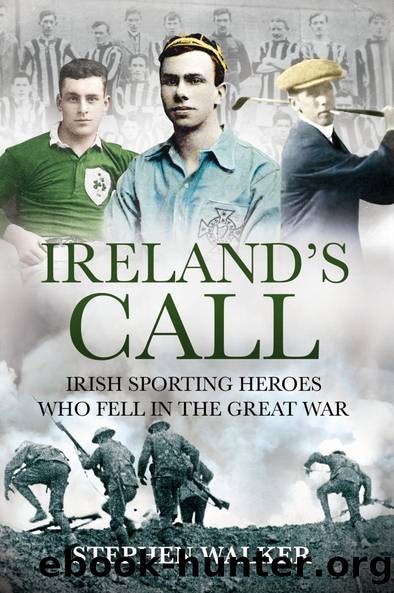Ireland's Call by Stephen Walker

Author:Stephen Walker [Walker, Stephen]
Language: eng
Format: epub
Tags: History, Europe, Ireland, General, Great Britain
ISBN: 9781785370212
Google: onvzDQAAQBAJ
Publisher: Merrion Press
Published: 2015-09-07T00:35:21+00:00
8 Red, Blue and Khaki
âFOR YOU WHO PLAY FOOTBALL WHILE OTHERS SEEK FAME, THE KNICKERS OF SPORT ARE THE GARMENTS OF SHAME.â
â Poem to encourage sportsmen to enlist, 1914
The outbreak of the Great War posed real difficulties for football clubs across all the home countries, and in August 1914 serious questions were asked about whether it was appropriate for the sport to continue to be played.
A debate began in local and national newspapers, and the question was a simple one. Should professional sport continue at a time of national crisis? The rugby authorities were quick to make a decision and encouraged players to enlist with battalions in their local area. The levels of recruitment were such that leading English clubs quickly cancelled fixtures because they simply did not have enough players to put together a team. In Ireland, the Irish Rugby Football Union, the gameâs governing body, took a similar approach to their counterparts in England, encouraging players to enlist. IRFU President Frank Browning, whose story is told elsewhere in this book, sent a circular to players in August 1914 just days after the war was declared, and he quickly established a corps of men who carried out drilling at Lansdowne Road.
Their number was not purely made up of rugby players; the ranks were swelled by athletes and a large number of rowers â men like Trinity College old boy Edward Millar, who represented his university and who would later lose his life in August 1915. Ernest Julian was another talented oarsman and rowing coach who enlisted after attending a meeting at Lansdowne Road. He was a Professor of Law at Trinity College Dublin, and would die at Suvla Bay in August 1915 in the colours of the Royal Dublin Fusiliers. Julian was one of fifty Trinity rowers who fell in the Great War.
In the cricketing world there was also an intense debate about how the game should respond to the outbreak of war, and whether fixtures should be fulfilled or cancelled. Initially, the MCC decided to carry on with their programme of games, but in late August 1914 opinion changed when the legendary cricketer-tuned-columnist W.G. Grace wrote a letter to The Sportsman newspaper. Grace, a revered and influential figure, argued that âthe time has arrived when the county cricket season should be closedâ. He went on to say that all first-class cricketers should âcome to the help of their country without delay in its hour of needâ. W.G. Graceâs intervention crystallised the debate, and days later Field Marshal Lord Roberts spoke at a gathering of army recruits and praised their decision to enlist, telling them:
How very different is your action to that of the men who still go on with their cricket and football, as if the very existence of the country were not at stake.
The thoughts of W.G. Grace and Lord Roberts convinced many in the cricketing world that the remaining matches of the season should be cancelled, and the MCC concluded that the remaining fixtures should not take place.
Download
This site does not store any files on its server. We only index and link to content provided by other sites. Please contact the content providers to delete copyright contents if any and email us, we'll remove relevant links or contents immediately.
| Afghan & Iraq Wars | American Civil War |
| American Revolution | Vietnam War |
| World War I | World War II |
Waking Up in Heaven: A True Story of Brokenness, Heaven, and Life Again by McVea Crystal & Tresniowski Alex(37808)
Empire of the Sikhs by Patwant Singh(23085)
We're Going to Need More Wine by Gabrielle Union(19046)
Hans Sturm: A Soldier's Odyssey on the Eastern Front by Gordon Williamson(18590)
Leonardo da Vinci by Walter Isaacson(13336)
The Radium Girls by Kate Moore(12028)
Tools of Titans by Timothy Ferriss(8395)
Educated by Tara Westover(8054)
How to Be a Bawse: A Guide to Conquering Life by Lilly Singh(7486)
Permanent Record by Edward Snowden(5847)
The Last Black Unicorn by Tiffany Haddish(5635)
The Rise and Fall of Senator Joe McCarthy by James Cross Giblin(5280)
Promise Me, Dad by Joe Biden(5153)
The Wind in My Hair by Masih Alinejad(5095)
A Higher Loyalty: Truth, Lies, and Leadership by James Comey(4963)
The Crown by Robert Lacey(4815)
The Iron Duke by The Iron Duke(4354)
Joan of Arc by Mary Gordon(4110)
Stalin by Stephen Kotkin(3965)
